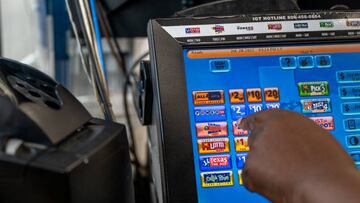How much tax would you have to pay if you win the $1.1 billion Mega Millions jackpot?
The roll-over estimated Mega Millions jackopt is over $1bn - but if the winner wants the money up front, it’ll be around a third of that after taxes.

Rubbing your hands together at the bumper jackpot in this week’s Mega Millions lottery draw? Well, so too is Uncle Sam. Depending on where you live in the United States, you could face quite the tax bill if your numbers come up. There was no winner in Tuesday’s Mega Millions draw, which means the rollover jackpot now stands at a cool $1.1 billion, the third-largest in the history of the lottery, according to the official Mega Millions website.
However, gambling winnings of over $5,000 are taxable in the US - and it’s not only federal taxes you have to think about. Your state may also want a cut. So even if you land the jackpot, quite a chunk of that change will be headed for the taxman’s ever-voracious pockets.
What one billion dollars really means
Mega Millions lump sum of over $600m up for grabs
The next draw is scheduled to take place at 11pm ET/8pm PT on Friday 29 July, when the Mega Millions draw will come with a rollover estimated jackpot of over $1bn. If you strike it rich by getting all six numbers, you’ll have two alternatives: the ‘cash option’ or the ‘annuity option’.
If you take the former, you’ll get the money as an up-front, lump-sum payment, but it won’t be for the full shebang. The ‘cash option’ payout is “equal to the cash in the Mega Millions jackpot prize pool”, the draw organizers say. In this instance, it works out at a lump sum payment of $602.5m.
Last night, nine Mega Millions tickets were one number short of winning $830 million
— UberFacts (@UberFacts) July 28, 2022
Were you to plump for the ‘annuity option’, on the other hand, you’d get the jackpot in its entirety, but not all at once: an immediate payment of about $15m would be followed by annual cheques over 30 years that increase by 5% each year, to a maximum of about $39m. This option protects people against (somehow) blowing their pot of gold all at once, but comes with the risk of tax hikes leading to higher rates being levied on your prize money further down the line.
The majority of winners tend to go for the lump-sum payment - “most of them want all their money now,” lottery spokesperson Elias Dominguez told ABC recently. Confused yet? You can bet your bottom dollar Uncle Sam has it all worked out.
A quarter of jackpot tax to IRS
Before the money reaches the jackpot winner, it’s subject to a 24% federal tax on gambling winnings - so, if this week’s one-time Mega Millions payout is $602.5m, that comes in at about $144m that you’d have to hand over to the IRS straight away. The federal taxman isn’t done there, though…
Top income tax bracket awaits
When tax season comes around, you’ll find yourself on the hook for another piece of your lottery money. That’s because a 10-figure Mega Millions win will have pushed you, rather comfortably, into the IRS’ highest income-tax bracket.
Currently, US tax residents must pay a top rate of 37% on annual earnings over $539,900, so you’ll be liable for the 13% difference between that and the 24% applied to gambling winnings. You’ll only have to fork out the top rate on every dollar above $539,900, though; lower levies will be applied to your winnings up to that amount. In short: expect the IRS to lop somewhere in the region of another $80m or so off that initial $602.5m.
All in all, then, if you scoop the jackpot and take the lump sum option, you’ll have to fork out around $224m in federal taxes, leaving you with about $378m.
#HangUp it’s a #SCAM!
— NYPD 104th Precinct (@NYPD104Pct) July 24, 2022
Be wary of any unknown person calling requesting payments of:
🚫Unclaimed lottery winnings
🚫Unpaid taxes owed to the IRS
🚫Relative/friend been arrested
🚫Outstanding bill unless you pay, your service will be shut off pic.twitter.com/3qXB6UionL
The best/worst states for lottery winners
But you won’t be done with tax forms even then. Your state’s tax office will want their slice of the pie as well, but if you live in one of California, Delaware, Florida, New Hampshire, South Dakota, Tennessee, Texas, Washington or Wyoming, you have no more tax obligations to worry about. California and Delaware impose state income tax but not on lottery winnings, while the other seven states don’t have an income tax.
We can also forget about Alabama, Alaska, Hawaii, Mississippi, Nevada and Utah, as you can’t play Mega Millions in those states.
Meanwhile, nine states - Colorado, Illinois, Indiana, Kentucky, Massachusetts, Michigan, North Carolina, Pennsylvania and Utah - have a flat income tax rate that’s mostly around the 5% mark. That means you’d have to cough up another $30m or so. The exceptions to that are Pennsylvania and Indiana, which would take 3.07% and 3.23%, respectively, from your winnings.
Elsewhere in the US, you’ll be looking at anything from 2.9% in North Dakota, to 10.75% in D.C., New Jersey and Wyoming, and 10.9% in New York.
Related stories
Check out the full list of state income tax rates in the US
Of course, the likelihood that you’ll actually have to consider any of the above is vanishingly remote. Per CNBC, the chance of a single Mega Millions ticket matching all six numbers is one in 302 million (1/302,000,000).

